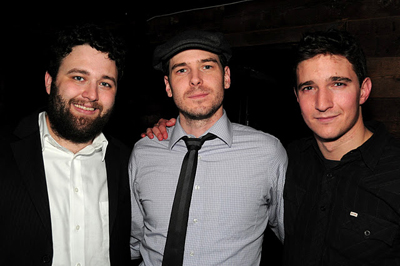FEATURED ARTIST
DECEMBER 2011
Camisade Theatre Company
A Theasy Interview with Founding Members Malcolm Madera, Jake Silbermann, and Samuel Brett Williams.

Samuel Brett Williams, Malcolm Madera, and Jake Silbermann. Photo by Andrea Reese.
How did Camisade begin? Who are the powers-that-be?
Malcolm Madera: I came across a play by Brett, I believe, my first year in New York. I loved Brett’s writing immediately and new that he was a writer I wanted to work with. Then, several years later, Jake and I were having a drink and talking about the kind of theatre that made us passionate and we decided well, enough talk, let’s make something happen. We approached Brett. He showed us Derby Day. And here we are. The intention wasn’t always to start a theatre company but we all worked so well together it seemed like a waste to just do one show and then walk away. Now we have assembled this dream team of designers and actors who are making Camisade more rewarding and fulfilling than I knew was possible.
Samuel Brett Williams: Jake and Malcolm came to me and asked about the possibility of a commission. They told me what they wanted, and I said that I actually might already have something for them. Derby Day is a play that I never sent out. My agents hadn’t even read it. It is my most personal play by far. It essentially deals with my father and his two brothers, and the behaviors I watched growing up across the street from a racetrack in small town Arkansas.
Jake Silbermann: I remember just before we held our first reading, Brett said “I really thought that was it for this play, I thought it was done.” I said, “No no no. That is most certainly not it for this play.” It’s too good to allow to sit on a shelf somewhere.
What is Camisade all about and what does your name signify?
SBW: Camisade is interested in exploring different parts of America -- parts that tend to not be shown on stage anymore for whatever reasons.
MM: Camisade comes from an old military term for a night ambush. We want to tell stories that catch audiences off guard and make them laugh where they usually wouldn’t or empathize where maybe they shouldn’t.
JS: Although I think it would be hard to describe, I know that the three of us share a very similar aesthetic when it comes to theatre and film, stories in general. We want to tell good stories.
What do you hope to add to the New York theatre scene? What makes your company different?
MM: Well, I think starting a theatre company is a lot like starting a band. Each member has their own likes and dislikes but you all work together to find a sound or voice that you can’t exactly put your finger on but you know it when you find it. Every theatre company in New York is unique because all humans are unique. We’re really just making theatre that we would want to go see and in doing so we hope to find an audience that shares our taste.
SBW: Jake is a lifetime New Yorker, Malcolm is from New Mexico, and I’m from Arkansas. We all have different perceptions of what it means to be an American. My reality growing up in Arkansas was much different than Jake’s; and Malcolm’s was different from ours. What is most intriguing to me is exploring these different sections, boxes I suppose, of the American experience. This first play is set in my hometown of Hot Springs, Arkansas, our next play will be set in New Mexico, and we’re already talking about our New York play.
JS: I love Malcolm’s band analogy. That’s incredibly apt as we are figuring what works for and with each other and we are all growing human beings. But as Brett points out, we have a plan that we’re excited about.
Derby Day, your first production, premieres this month. What excites you most about this play?
SBW: To me there is something uniquely American about the racetrack. It is built for dreamers. People go there talking about who they are going to put their money on, and then what they are going to do with their winnings. I have always been interested in how anticlimactic the races are -- whether you win or lose. It is always much more fun to look to a perfect future, where, as Johnny from the play states, “Your horse will come in and everything will be good.” As Americans, I think we’re all still looking to that perfect future, no matter how long the odds may seem, no matter the evidence presented to the contrary.
What can audiences expect from Derby Day?
MM: A lot of laughs. A lot of heart. And a huge mess!
SBW: Hopefully they’ll experience a world they haven’t seen on stage before -- a part of America they don’t necessarily think about much.
JS: A fun show that may demand more of you than expected.
